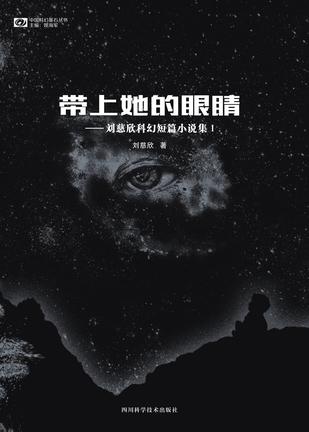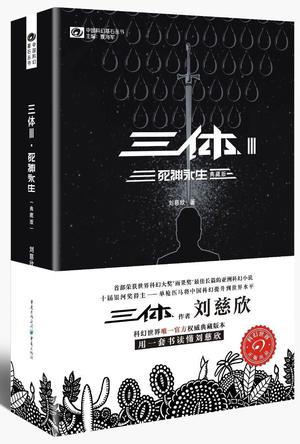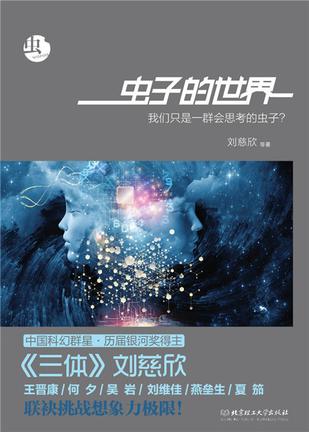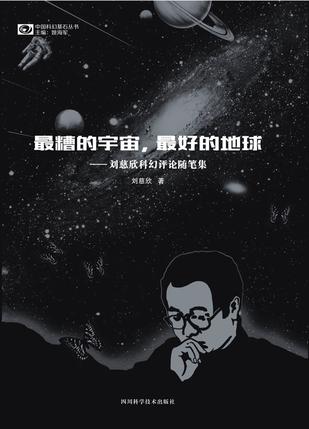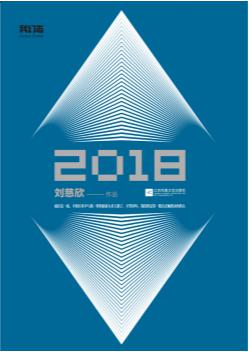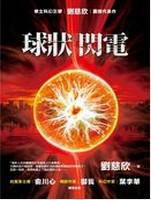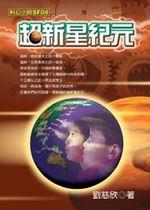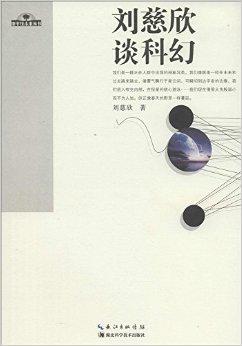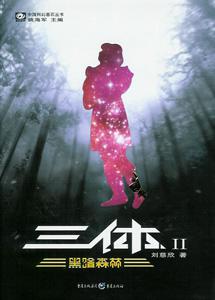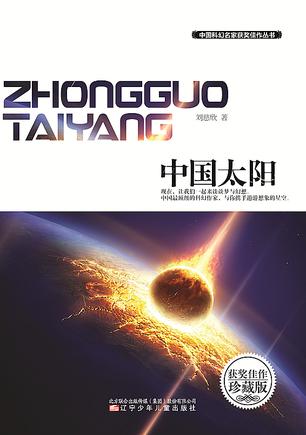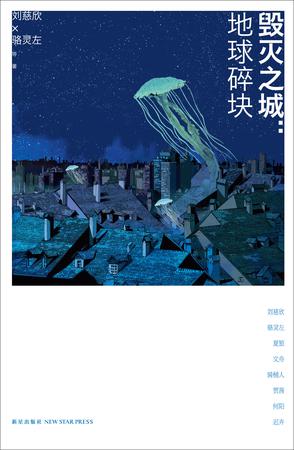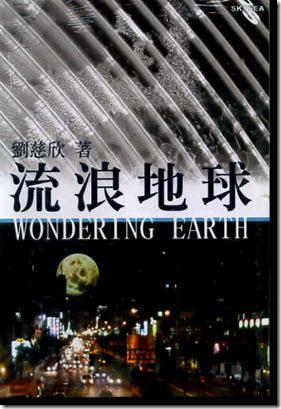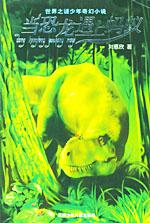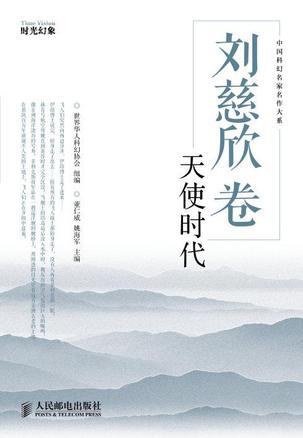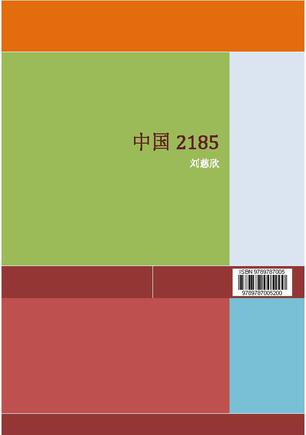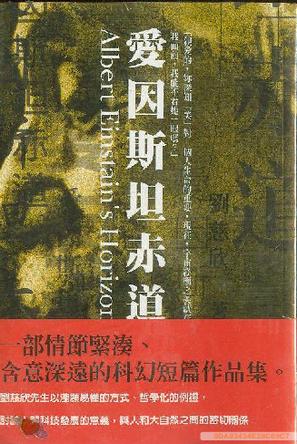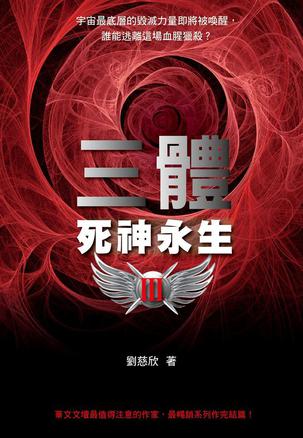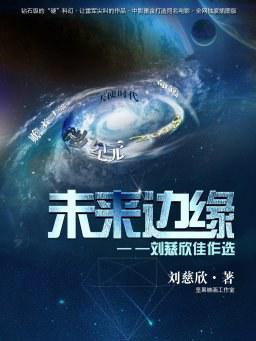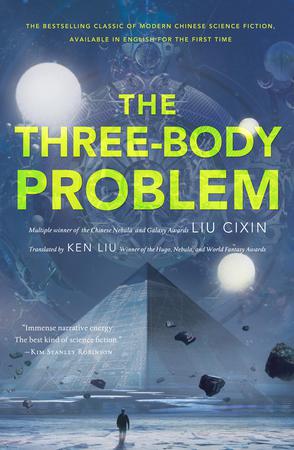欢迎来到相识电子书!
标签:刘慈欣
-
带上她的眼睛
刘慈欣科幻作品典藏•科幻世界唯一官方权威版本——《带上她的眼睛》刘慈欣科幻短篇小说集Ⅰ 刘慈欣的短篇小说构思巧妙,想象力纵横恣肆,将坚实的科学基础和厚重的人文情怀隐藏在灵动精致的故事结构中,代表了新时期以来中国科幻的最高成就。 《刘慈欣科幻短篇小说集》以时间为线,收录了刘慈欣发表处女作以来创作的优秀短篇科幻小说,是迄今为止最全面也最权威的版本。 莫 言(诺贝尔文学奖获得者)◆刘慈欣的小说,有非常深厚的修养和准备。他利用深厚的科学知识作为想象力的基础,把人间的生活、想象的生活融合在一起,产生了独特的趣味。 韩 松(科幻作家)◆刘慈欣近乎完美地把中国5000年历史与宇宙150亿年现实融合在了一起。 严 锋(复旦大学中文系教授)◆刘慈欣单枪匹马,把中国科幻提升到了世界水平。 -
虫子的世界
银河中心地带爆发大规模战争。战争波及到银河系边缘地带的太阳系。为了取得战争的全面胜利,C基外星人准备用“奇点炸弹”炸毁太阳系。这样地球人将全部灭亡。 危机时刻,一位身患绝症的乡村教师,在临终之际正为几个学生上最后一堂课。外星人在炸毁太阳前10分钟,意外的发现了地球上的乡村教师和他的几个学生。通过对这位乡村教师和几个学生的了解,外星人发现地球人与他们一样,同为C级生物,并且同样懂得物理学!于是,在是否炸毁太阳系这个问题上,外星人出现了犹豫。而这时,他们发射的“奇点炸弹”,距太阳只有5分钟的路程,就要爆炸了…… -
最糟的宇宙,最好的地球
《刘慈欣科幻随笔集》以时间为线,将作者历年发表的代表性文章结成文集,系统展现其科幻理念的变迁与演进。通过本书,读者可进一步深入刘慈欣的奇妙世界,领略独特的科幻之美和它带来的思想上飞一样的自由。 -
2018
公元2018年,网络信息技术飞速发展,在现实国家中衍生出虚拟国家,现实国家中的人类在虚拟国家拥有着另一种截然不同的身份。虚拟国家人口数量已达到20亿,虚拟的国际社会不但架构起完备的国际社群,更向联合国申请获得与现实国家同等的地位。与此同现时现实社会中,不计其数的人类将面临着知识结构过时的悲惨境况。无论是加入虚拟国家还是继续存留于现实国家,主人公都必然无所适从,于是他窃取公款对自己进行了基因改造,此后,他将拥有长达三百年的漫长人生去应对一切。 -
球狀閃電
多年未歸的老家,竟被打掃得一塵不染,但鄰居卻說沒有人來過。 父親生前所繪的風景畫上,出現了當時還未完成的建築。 洗手台上浮現了母親的白髮,卻在轉瞬間消逝無蹤。 自從少年眼睜睜看著自己的父母被球狀閃電蒸發以後,一切都詭異了起來。 球狀閃電,一種真實存在的氣象學之謎。 逾一百七十年的研究,兩千份科學論文,對這個現象的科學解釋仍莫衷一是。 甚至有研究認為球狀閃電是人類的幻覺。 它到底是什麼?這種種異象究竟是怎麼一回事? 這是少年窮究一生要破解的謎團。 為了更接近那個神祕的自然之謎,少年選擇進入了大氣科學系。就在他浸淫於科學研究時,怪事卻一樁接一樁地發生了…… ◎中國最大書評網站豆瓣網,四顆半星好評,萬名讀者一致推薦! -
超新星紀元
在一個看似平常的夏夜,醞釀了上億年的災難從宇宙深處到達地球,一次突發性的超新星爆發,讓這個世界只剩下孩子。當黑屏上的最後一點綠光消逝,地球上最後一個大人死去,西元世紀也跟著終結了。怪異而血腥的游擊戰在都市近郊的山谷中展開,孩子國家領袖在其中誕生。 從大人手中交接了這個世界之後,孩子們利用各種先進的資訊科技領導這瘋狂的一切,爆燃時代、慣性時代、糖城時代……超新星紀元的世界是一部壯麗的未來史,一部文明浴火重生的宏大史詩,比夢幻更空靈,比現實更逼真。 -
刘慈欣谈科幻
《地平线未来丛书(第1辑):刘慈欣谈科幻》本书有作者在创作科幻小说时的心路历程,有作者对一些经典科幻作品的精彩书评、影评,还有一些对话与访谈,折射出作者作为一个科幻迷对科幻、对未来的看法,也展现出科幻作家独特的浪漫主义情怀。 -
中国太阳
《中国太阳(获奖佳作珍藏版)》收录了中国科幻文学领军人物刘慈欣的《中国太阳》《微纪元》《人和吞食者》等五篇短篇小说,《》中《中国太阳》获得了2002年中国科幻银河奖一等奖,《人和吞食者》获得了2002年中国科幻银河奖读者提名奖。《中国太阳》通过个农村小孩水娃的梦想,将读者的视角引入太空,展现了他恢宏的想象力与人文思考精神。文中描绘的种种奇观,让人叹为观止。 -
毁灭之城:地球碎块
这是在诡谲、瑰丽、奇妙的异世界中,最令人激动的一次旅行。在这次旅行中,南京被卷成一个球,上海变成一片火海,太原死于电脑病毒,留下北京坐镇铁板烧,地球干脆变成十七块,在宇宙中四散逃命…… 生存还是毁灭,这不是一个问题,而是一个系列,你的人生系列。 中式幻想文学最强品牌“九州幻想” 三年磨一剑,超级作家阵容,绝佳作品全收录! 这是中国幻想作家群的一次大集群 这是中国幻想文学的一次再出发 这是曾创造无数超级畅销书的品牌“九州幻想”的涅槃之旅 “九州”,这个中式幻想文学最强品牌,再一次,吹响了畅销书的号角! 刘慈欣、潘海天、夏笳、迟卉、骑桶人、有时右逝、杨叛、七月、万象峰年……二十余位本土最佳幻想文学作者齐聚一堂 今何在、韩松、刘慈欣魔幻推荐! -
当恐龙遇上蚂蚁
《世界之谜少年奇幻小说:当恐龙遇上蚂蚁》主要内容:如果就这么正常发展下去,恐龙和蚂蚁的社会大概都不可能继续进化了。这两个物种刚刚燃起的智慧之火将在时间的长河中渐渐熄灭,就如同在它们之前和之后的无数物种曾经有过的那样,只是地球历史的漫漫长夜中闪现的两点转瞬即逝的萤光。 -
刘慈欣卷:天使时代
本书收录了著名科幻作家刘慈欣的中短篇科幻小说代表作品《天使时代》、《鲸歌》、《坍缩》、《微纪元》、《人和吞食者》、《混沌蝴蝶》、《圆圆的肥皂泡》等共10篇。 本书适合青少年读者、科幻和文学爱好者阅读。 开本 880X1230 32开 206千字 1彩插 -
爱因斯坦赤道
收錄劉慈欣的四部中篇科幻小說:《朝聞道》(本書中題目更改為《愛因斯坦赤道》),《帶上她的眼睛》,《混沌蝴蝶》和《全頻道阻塞幹擾》。其中《全頻道阻塞幹擾》一文與之前在大陸發行的版本有所不同,大陸發行版本中,戰爭雙方為俄羅斯北約,通常稱為俄羅斯版,這其實是修改版;而本版中,交戰雙方為中國與北約,俄羅斯及日本,通常稱為中國版,這才是原版,但由於眾所周知的原因,在大陸發表的的是修改後的俄羅斯版。 -
三體 Ⅲ
◆二十一世紀中國文壇最值得注意的作家——劉慈欣,最暢銷系列作完結篇! 二○○六年,《三體》開始在《科幻世界》雜誌連載,引起熱烈迴響;二○一○年,《三體Ⅲ:死神永生》在中國上市,首刷十萬本,甫上市立即銷售一空、緊急再刷。在台灣,《三體》第一部尚未出版,試讀迴響踴躍,也在批踢踢形成「洗版」現象。「三體」不但是華文科幻的最熱話題,劉慈欣更成為第一個被好萊塢買下電影改編權的華文科幻作家! 劉慈欣在中國擁有數量龐大的擁護者,王德威譽為「二十一世紀中國文壇最值得注意的作家」。《三體》系列所展現的開闊格局,將華文科幻帶向前所未有的高度。劉慈欣之於科幻,如同金庸之於武俠,都將類型小說寫出了迥異於以往的恢弘格局。他筆下的許多人物角色,也深植書迷心中,令人神往。 宇宙最底層的毀滅力量即將被喚醒,誰能逃離這場慘烈的獵殺? 與三體文明的戰爭讓人類第一次看見宇宙黑暗的真相,地球文明像一個恐懼的孩子,熄滅了尋友的希望,在暗夜中瑟瑟發抖。 為了與三體文明抗衡,地球文明選出了掌握全人類命運的「執劍人」。執劍人終日鎮守著一個開關——這個開關主宰了兩個世界的戰略平衡,當危機來臨時,執劍人必須毅然按下毀滅世界的按鈕,讓兩個文明同歸於盡。 第一代執劍人羅輯孤寂地堅守崗位,緊握著每一秒都一觸即發的地雷,維持著兩個世界的恐怖平衡。半個世紀的漫長歲月過去了,羅輯終於完成他的使命,新一代的執劍人也即將誕生。然而就在此時,宇宙最底層的毀滅力量卻悄悄地被喚醒…… 三體系列:《三體》、《三體II:黑暗森林》、《三體III:死神永生》 -
未来边缘
刘慈欣科幻精选佳作,立于想象之巅! 钻石级的“硬”科幻、让雷军尖叫的作品、中影集团重金打造同名电影、全网独家插图版。 《末日边缘——刘慈欣佳作选》精选了《天使时代》、《2018年4月1日》、《微纪元》、《赡养上帝》、《命运》5篇佳作。 《天使时代》 一次科技与伦理的碰撞,一场生与死的考验。 相对于具有基因和功能优势的新人类,原有的人类是否会沦为低等生物?原有的社会结构是否会继续存在?新人类与原来的人类是否处于食物链的同一等级上? 这都是很具体的难题。 《2018年4月1日》 假设在2018年,人类拥有了可以改变基因延长寿命的技术。通过延基,人类寿命可达300年。你身边的人还是你爱的人吗? 这是一个用最坚硬的科幻外壳包裹着的,一个浪漫忧伤的情感故事。 《微纪元》 如果把人类缩小到细菌那么大,我们的地球会不会变得更美丽? 《赡养上帝》 整整有20亿老头子的上帝文明,在宇宙的各处撒下生命的种子(包括我们的地球),但当一个种族完全失去创造力和想象力的时候,他们就只能依靠机器生存。我们的上帝已走投无路,他们的飞船已经老化,并且无法修理。巧合中,他们抵达了地球,打算在此过完余生…… 任何文明呆在原地不动,就等于自杀。 《命运》 恐龙主宰的世界,人类的下场是怎样的呢? 一对情侣时空旅行时,遇到一颗撞向地球的小行星,为了拯救人类,就碰撞小行星改变其方向,后来发现,他俩也因此改变了历史,恐龙因此成为了地球的主宰! -
The Three-Body Problem
Three-Body Problem is the first chance for English-speaking readers to experience this multiple award winning phenomenon from China’s most beloved science fiction author, Liu Cixin. Set against the backdrop of China’s Cultural Revolution, a secret military project sends signals into space to establish contact with aliens. An alien civilization on the brink of destruction captures the signal and plans to invade Earth. Meanwhile, on Earth, different camps start forming, planning to either welcome the superior beings and help them take over a world seen as corrupt, or to fight against the invasion. The result is a science fiction masterpiece of enormous scope and vision. ___________________________________________________________________________Excerpt. © Reprinted by permission. All rights reserved. 1 The Madness Years China, 1967 The Red Union had been attacking the headquarters of the April Twenty-eighth Brigade for two days. Their red flags fluttered restlessly around the brigade building like flames yearning for firewood. The Red Union commander was anxious, though not because of the defenders he faced. The more than two hundred Red Guards of the April Twenty-eighth Brigade were mere greenhorns compared with the veteran Red Guards of the Red Union, which was formed at the start of the Great Proletarian Cultural Revolution in early 1966. The Red Union had been tempered by the tumultuous experience of revolutionary tours around the country and seeing Chairman Mao in the great rallies in Tiananmen Square. But the commander was afraid of the dozen or so iron stoves inside the building, filled with explosives and connected to each other by electric detonators. He couldn’t see them, but he could feel their presence like iron sensing the pull of a nearby magnet. If a defender flipped the switch, revolutionaries and counter-revolutionaries alike would all die in one giant ball of fire. And the young Red Guards of the April Twenty-eighth Brigade were indeed capable of such madness. Compared with the weathered men and women of the first generation of Red Guards, the new rebels were a pack of wolves on hot coals, crazier than crazy. The slender figure of a beautiful young girl emerged at the top of the building, waving the giant red banner of the April Twenty-eighth Brigade. Her appearance was greeted immediately by a cacophony of gunshots. The weapons attacking her were a diverse mix: antiques such as American carbines, Czech-style machine guns, Japanese Type-38 rifles; newer weapons such as standard-issue People’s Liberation Army rifles and submachine guns, stolen from the PLA after the publication of the “August Editorial”1; and even a few Chinese dadao swords and spears. Together, they formed a condensed version of modern history. Numerous members of the April Twenty-eighth Brigade had engaged in similar displays before. They’d stand on top of the building, wave a flag, shout slogans through megaphones, and scatter flyers at the attackers below. Every time, the courageous man or woman had been able to retreat safely from the hailstorm of bullets and earn glory for their valor. The new girl clearly thought she’d be just as lucky. She waved the battle banner as though brandishing her burning youth, trusting that the enemy would be burnt to ashes in the revolutionary flames, imagining that an ideal world would be born tomorrow from the ardor and zeal coursing through her blood.… She was intoxicated by her brilliant, crimson dream until a bullet pierced her chest. Her fifteen-year-old body was so soft that the bullet hardly slowed down as it passed through it and whistled in the air behind her. The young Red Guard tumbled down along with her flag, her light form descending even more slowly than the piece of red fabric, like a little bird unwilling to leave the sky. The Red Union warriors shouted in joy. A few rushed to the foot of the building, tore away the battle banner of the April Twenty-eighth Brigade, and seized the slender, lifeless body. They raised their trophy overhead and flaunted it for a while before tossing it toward the top of the metal gate of the compound. Most of the gate’s metal bars, capped with sharp tips, had been pulled down at the beginning of the factional civil wars to be used as spears, but two still remained. As their sharp tips caught the girl, life seemed to return momentarily to her body. The Red Guards backed up some distance and began to use the impaled body for target practice. For her, the dense storm of bullets was now no different from a gentle rain, as she could no longer feel anything. From time to time, her vinelike arms jerked across her body softly, as though she were flicking off drops of rain. And then half of her young head was blown away, and only a single, beautiful eye remained to stare at the blue sky of 1967. There was no pain in that gaze, only solidified devotion and yearning. And yet, compared to some others, she was fortunate. At least she died in the throes of passionately sacrificing herself for an ideal. * * * Battles like this one raged across Beijing like a multitude of CPUs working in parallel, their combined output, the Cultural Revolution. A flood of madness drowned the city and seeped into every nook and cranny. At the edge of the city, on the exercise grounds of Tsinghua University, a mass “struggle session” attended by thousands had been going on for nearly two hours. This was a public rally intended to humiliate and break down the enemies of the revolution through verbal and physical abuse until they confessed to their crimes before the crowd. As the revolutionaries had splintered into numerous factions, opposing forces everywhere engaged in complex maneuvers and contests. Within the university, intense conflicts erupted between the Red Guards, the Cultural Revolution Working Group, the Workers’ Propaganda Team, and the Military Propaganda Team. And each faction divided into new rebel groups from time to time, each based on different backgrounds and agendas, leading to even more ruthless fighting. But for this mass struggle session, the victims were the reactionary bourgeois academic authorities. These were the enemies of every faction, and they had no choice but to endure cruel attacks from every side. Compared to other “Monsters and Demons,”2 reactionary academic authorities were special: During the earliest struggle sessions, they had been both arrogant and stubborn. That was also the stage in which they had died in the largest numbers. Over a period of forty days, in Beijing alone, more than seventeen hundred victims of struggle sessions were beaten to death. Many others picked an easier path to avoid the madness: Lao She, Wu Han, Jian Bozan, Fu Lei, Zhao Jiuzhang, Yi Qun, Wen Jie, Hai Mo, and other once-respected intellectuals had all chosen to end their lives.3 Those who survived that initial period gradually became numb as the ruthless struggle sessions continued. The protective mental shell helped them avoid total breakdown. They often seemed to be half asleep during the sessions and would only startle awake when someone screamed in their faces to make them mechanically recite their confessions, already repeated countless times. Then, some of them entered a third stage. The constant, unceasing struggle sessions injected vivid political images into their consciousness like mercury, until their minds, erected upon knowledge and rationality, collapsed under the assault. They began to really believe that they were guilty, to see how they had harmed the great cause of the revolution. They cried, and their repentance was far deeper and more sincere than that of those Monsters and Demons who were not intellectuals. For the Red Guards, heaping abuse upon victims in those two latter mental stages was utterly boring. Only those Monsters and Demons who were still in the initial stage could give their overstimulated brains the thrill they craved, like the red cape of the matador. But such desirable victims had grown scarce. In Tsinghua there was probably only one left. Because he was so rare, he was reserved for the very end of the struggle session. Ye Zhetai had survived the Cultural Revolution so far, but he remained in the first mental stage. He refused to repent, to kill himself, or to become numb. When this physics professor walked onto the stage in front of the crowd, his expression clearly said: Let the cross I bear be even heavier. The Red Guards did indeed have him carry a burden, but it wasn’t a cross. Other victims wore tall hats made from bamboo frames, but his was welded from thick steel bars. And the plaque he wore around his neck wasn’t wooden, like the others, but an iron door taken from a laboratory oven. His name was written on the door in striking black characters, and two red diagonals were drawn across them in a large X. Twice the number of Red Guards used for other victims escorted Ye onto the stage: two men and four women. The two young men strode with confidence and purpose, the very image of mature Bolshevik youths. They were both fourth-year students4 majoring in theoretical physics, and Ye was their professor. The women, really girls, were much younger, second-year students from the junior high school attached to the university.5 Dressed in military uniforms and equipped with bandoliers, they exuded youthful vigor and surrounded Ye Zhetai like four green flames. His appearance excited the crowd. The shouting of slogans, which had slackened a bit, now picked up with renewed force and drowned out everything else like a resurgent tide. After waiting patiently for the noise to subside, one of the male Red Guards turned to the victim. “Ye Zhetai, you are an expert in mechanics. You should see how strong the great unified force you’re resisting is. To remain so stubborn will lead only to your death! Today, we will continue the agenda from the last time. There’s no need to waste words. Answer the following question without your typical deceit: Between the years of 1962 and 1965, did you not decide on your own to add relativity to the intro physics course?” “Relativity is part of the fundamental theories of physics,” Ye answered. “How can a basic survey course not teach it?” “You lie!” a female Red Guard by his side shouted. “Einstein is a reactionary academic authority. He would serve any master who dangled money in front of him. He even went to the American Imperialists and helped them build the atom bomb! To develop a revolutionary science, we must overthrow the black banner of capitalism represented by the theory of relativity!” Ye remained silent. Enduring the pain brought by the heavy iron hat and the iron plaque hanging from his neck, he had no energy to answer questions that were not worth answering. Behind him, one of his students also frowned. The girl who had spoken was the most intelligent of the four female Red Guards, and she was clearly prepared, as she had been seen memorizing the struggle session script before coming onstage. But against someone like Ye Zhetai, a few slogans like that were insufficient. The Red Guards decided to bring out the new weapon they had prepared against their teacher. One of them waved to someone offstage. Ye’s wife, physics professor Shao Lin, stood up from the crowd’s front row. She walked onto the stage dressed in an ill-fitting green outfit, clearly intended to imitate the military uniform of the Red Guards. Those who knew her remembered that she had often taught class in an elegant qipao, and her current appearance felt forced and awkward. “Ye Zhetai!” She was clearly unused to such theater, and though she tried to make her voice louder, the effort magnified the tremors in it. “You didn’t think I would stand up and expose you, criticize you? Yes, in the past, I was fooled by you. You covered my eyes with your reactionary view of the world and science! But now I am awake and alert. With the help of the revolutionary youths, I want to stand on the side of the revolution, the side of the people!” She turned to face the crowd. “Comrades, revolutionary youths, revolutionary faculty and staff, we must clearly understand the reactionary nature of Einstein’s theory of relativity. This is most apparent in general relativity: Its static model of the universe negates the dynamic nature of matter. It is anti-dialectical! It treats the universe as limited, which is absolutely a form of reactionary idealism.…” As he listened to his wife’s lecture, Ye allowed himself a wry smile. Lin, I fooled you? Indeed, in my heart you’ve always been a mystery. One time, I praised your genius to your father—he’s lucky to have died early and escaped this catastrophe—and he shook his head, telling me that he did not think you would ever achieve much academically. What he said next turned out to be so important to the second half of my life: “Lin Lin is too smart. To work in fundamental theory, one must be stupid.” In later years, I began to understand his words more and more. Lin, you truly are too smart. Even a few years ago, you could feel the political winds shifting in academia and prepared yourself. For example, when you taught, you changed the names of many physical laws and constants: Ohm’s law you called resistance law, Maxwell’s equations you called electromagnetic equations, Planck’s constant you called the quantum constant.… You explained to your students that all scientific accomplishments resulted from the wisdom of the working masses, and those capitalist academic authorities only stole these fruits and put their names on them. But even so, you couldn’t be accepted by the revolutionary mainstream. Look at you now: You’re not allowed to wear the red armband of the “revolutionary faculty and staff”; you had to come up here empty-handed, without the status to carry a Little Red Book.… You can’t overcome the fault of being born to a prominent family in pre-revolutionary China and of having such famous scholars as parents. But you actually have more to confess about Einstein than I do. In the winter of 1922, Einstein visited Shanghai. Because your father spoke fluent German, he was asked to accompany Einstein on his tour. You told me many times that your father went into physics because of Einstein’s encouragement, and you chose physics because of your father’s influence. So, in a way, Einstein can be said to have indirectly been your teacher. And you once felt so proud and lucky to have such a connection. Later, I found out that your father had told you a white lie. He and Einstein had only one very brief conversation. The morning of November 13, 1922, he accompanied Einstein on a walk along Nanjing Road. Others who went on the walk included Yu Youren, president of Shanghai University, and Cao Gubing, general manager of the newspaper Ta Kung Pao. When they passed a maintenance site in the road bed, Einstein stopped next to a worker who was smashing stones and silently observed this boy with torn clothes and dirty face and hands. He asked your father how much the boy earned each day. After asking the boy, he told Einstein: five cents. This was the only time he spoke with the great scientist who changed the world. There was no discussion of physics, of relativity, only cold, harsh reality. According to your father, Einstein stood there for a long time after hearing the answer, watching the boy’s mechanical movements, not even bothering to smoke his pipe as the embers went out. After your father recounted this memory to me, he sighed and said, “In China, any idea that dared to take flight would only crash back to the ground. The gravity of reality is too strong.” “Lower your head!” one of the male Red Guards shouted. This may actually have been a gesture of mercy from his former student. All victims being struggled against were supposed to lower their heads. If Ye did lower his head, the tall, heavy iron hat would fall off, and if he kept his head lowered, there would be no reason to put it back on him. But Ye refused and held his head high, supporting the heavy weight with his thin neck. “Lower your head, you stubborn reactionary!” One of the girl Red Guards took off her belt and swung it at Ye. The copper belt buckle struck his forehead and left a clear impression that was quickly blurred by oozing blood. He swayed unsteadily for a few moments, then stood straight and firm again. One of the male Red Guards said, “When you taught quantum mechanics, you also mixed in many reactionary ideas.” Then he nodded at Shao Lin, indicating that she should continue. Shao was happy to oblige. She had to keep on talking, otherwise her fragile mind, already hanging on only by a thin thread, would collapse completely. “Ye Zhetai, you cannot deny this charge! You have often lectured students on the reactionary Copenhagen interpretation of quantum mechanics.” “It is, after all, the explanation recognized to be most in line with experimental results.” His tone, so calm and collected, surprised and frightened Shao Lin. “This explanation posits that external observation leads to the collapse of the quantum wave function. This is another expression of reactionary idealism, and it’s indeed the most brazen expression.” “Should philosophy guide experiments, or should experiments guide philosophy?” Ye’s sudden counterattack shocked those leading the struggle session. For a moment they did not know what to do. “Of course it should be the correct philosophy of Marxism that guides scientific experiments!” one of the male Red Guards finally said. “Then that’s equivalent to saying that the correct philosophy falls out of the sky. This is against the idea that the truth emerges from experience. It’s counter to the principles of how Marxism seeks to understand nature.” Shao Lin and the two college student Red Guards had no answer for this. Unlike the Red Guards who were still in junior high school, they couldn’t completely ignore logic. But the four junior high girls had their own revolutionary methods that they believed were invincible. The girl who had hit Ye before took out her belt and whipped Ye again. The other three girls also took off their belts to strike at Ye. With their companion displaying such revolutionary fervor, they had to display even more, or at least the same amount. The two male Red Guards didn’t interfere. If they tried to intervene now, they would be suspected of being insufficiently revolutionary. “You also taught the big bang theory. This is the most reactionary of all scientific theories.” One of the male Red Guards spoke up, trying to change the subject. “Maybe in the future this theory will be disproven. But two great cosmological discoveries of this century—Hubble’s law, and observation of the cosmic microwave background–show that the big bang theory is currently the most plausible explanation for the origin of the universe.” “Lies!” Shao Lin shouted. Then she began a long lecture about the big bang theory, remembering to splice in insightful critiques of the theory’s extremely reactionary nature. But the freshness of the theory attracted the most intelligent of the four girls, who couldn’t help but ask, “Time began with the singularity? So what was there before the singularity?” “Nothing,” Ye said, the way he would answer a question from any curious young person. He turned to look at the girl kindly. With his injuries and the tall iron hat, the motion was very difficult. “No … nothing? That’s reactionary! Completely reactionary!” the frightened girl shouted. She turned to Shao Lin, who gladly came to her aid. “The theory leaves open a place to be filled by God.” Shao nodded at the girl. The young Red Guard, confused by these new thoughts, finally found her footing. She raised her hand, still holding the belt, and pointed at Ye. “You: you’re trying to say that God exists?” “I don’t know.” “What?” “I’m saying I don’t know. If by ‘God’ you mean some kind of superconsciousness outside the universe, I don’t know if it exists or not. Science has given no evidence either way.” Actually, in this nightmarish moment, Ye was leaning toward believing that God did not exist. This extremely reactionary statement caused a commotion in the crowd. Led by one of the Red Guards on stage, another tide of slogan-shouting exploded. “Down with reactionary academic authority Ye Zhetai!” “Down with all reactionary academic authorities!” “Down with all reactionary doctrines!” Once the slogans died down, the girl shouted, “God does not exist. All religions are tools concocted by the ruling class to paralyze the spirit of the people!” “That is a very one-sided view,” Ye said calmly. The young Red Guard, embarrassed and angry, reached the conclusion that, against this dangerous enemy, all talk was useless. She picked up her belt and rushed at Ye, and her three companions followed. Ye was tall, and the four fourteen-year-olds had to swing their belts upward to reach his head, still held high. After a few strikes, the tall iron hat, which had protected him a little, fell off. The continuing barrage of strikes by the metal buckles finally made him fall down. The young Red Guards, encouraged by their success, became even more devoted to this glorious struggle. They were fighting for faith, for ideals. They were intoxicated by the bright light cast on them by history, proud of their own bravery.… Ye’s two students had finally had enough. “The chairman instructed us to ‘rely on eloquence rather than violence’!” They rushed over and pulled the four semicrazed girls off Ye. But it was already too late. The physicist lay quietly on the ground, his eyes still open as blood oozed from his head. The frenzied crowd sank into silence. The only thing that moved was a thin stream of blood. Like a red snake, it slowly meandered across the stage, reached the edge, and dripped onto a chest below. The rhythmic sound made by the blood drops was like the steps of someone walking away. A cackling laugh broke the silence. The sound came from Shao Lin, whose mind had finally broken. The laughter frightened the attendees, who began to leave the struggle session, first in trickles, and then in a flood. The exercise grounds soon emptied, leaving only one young woman below the stage. She was Ye Wenjie, Ye Zhetai’s daughter. As the four girls were taking her father’s life, she had tried to rush onto the stage. But two old university janitors held her down and whispered into her ear that she would lose her own life if she went. The mass struggle session had turned into a scene of madness, and her appearance would only incite more violence. She had screamed and screamed, but she had been drowned out by the frenzied waves of slogans and cheers. When it was finally quiet again, she was no longer capable of making any sound. She stared at her father’s lifeless body, and the thoughts she could not voice dissolved into her blood, where they would stay with her for the rest of her life. After the crowd dispersed, she remained like a stone statue, her body and limbs in the positions they were in when the two old janitors had held her back. After a long time, she finally let her arms down, walked slowly onto the stage, sat next to her father’s body, and held one of his already-cold hands, her eyes staring emptily into the distance. When they finally came to carry away the body, she took something from her pocket and put it into her father’s hand: his pipe. Wenjie quietly left the exercise grounds, empty save for the trash left by the crowd, and headed home. When she reached the foot of the faculty housing apartment building, she heard peals of crazy laughter coming out of the second-floor window of her home. That was the woman she had once called mother. Wenjie turned around, not caring where her feet would carry her. Finally, she found herself at the door of Professor Ruan Wen. Throughout the four years of Wenjie’s college life, Professor Ruan had been her advisor and her closest friend. During the two years after that, when Wenjie had been a graduate student in the Astrophysics Department, and through the subsequent chaos of the Cultural Revolution, Professor Ruan remained her closest confidante, other than her father. Ruan had studied at Cambridge University, and her home had once fascinated Wenjie: refined books, paintings, and records brought back from Europe; a piano; a set of European-style pipes arranged on a delicate wooden stand, some made from Mediterranean briar, some from Turkish meerschaum. Each of them seemed suffused with the wisdom of the man who had once held the bowl in his hand or clamped the stem between his teeth, deep in thought, though Ruan had never mentioned the man’s name. The pipe that had belonged to Wenjie’s father had in fact been a gift from Ruan. This elegant, warm home had once been a safe harbor for Wenjie when she needed to escape the storms of the larger world, but that was before Ruan’s home had been searched and her possessions seized by the Red Guards. Like Wenjie’s father, Ruan had suffered greatly during the Cultural Revolution. During her struggle sessions, the Red Guards had hung a pair of high heels around her neck and streaked her face with lipstick to show how she had lived the corrupt lifestyle of a capitalist. Wenjie pushed open the door to Ruan’s home, and she saw that the chaos left by the Red Guards had been cleaned up: The torn oil paintings had been glued back together and rehung on the walls; the toppled piano had been set upright and wiped clean, though it was broken and could no longer be played; the few books left behind had been put back neatly on the shelf.… Ruan was sitting on the chair before her desk, her eyes closed. Wenjie stood next to Ruan and gently caressed her professor’s forehead, face, and hands—all cold. Wenjie had noticed the empty sleeping pill bottle on the desk as soon as she came in. She stood there for a while, silent. Then she turned and walked away. She could no longer feel grief. She was now like a Geiger counter that had been subjected to too much radiation, no longer capable of giving any reaction, noiselessly displaying a reading of zero. But as she was about to leave Ruan’s home, Wenjie turned around for a final look. She noticed that Professor Ruan had put on makeup. She was wearing a light coat of lipstick and a pair of high heels. Copyright © 2006 by (Liu Cixin)
热门标签
下载排行榜
- 1 梦的解析:最佳译本
- 2 李鸿章全传
- 3 淡定的智慧
- 4 心理操控术
- 5 哈佛口才课
- 6 俗世奇人
- 7 日瓦戈医生
- 8 笑死你的逻辑学
- 9 历史老师没教过的历史
- 10 1分钟和陌生人成为朋友

